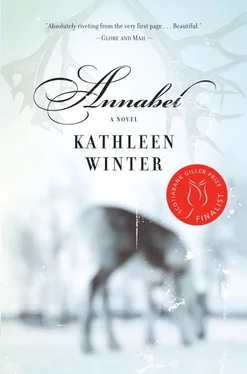“I won’t get a chance to use what your father sent me yet,” she said. “Not in this week’s concert. But I asked Jeremy if he had ever conducted it and if we could do it in another concert, and he said it is one of his favourite pieces of music too and we might do it next spring.”
“What my father sent you?”
Wayne knew nothing about the time Treadway Blake had ordered a replacement for Wally’s lost copy of Gabriel Fauré’s “Cantique de Jean Racine.” But Wally Michelin had not forgotten it, and she took it out of her black folder now. It had the imprint of Albert J. Breton on it and Wayne could see that the paper was now old and that Wally had bookmarked it in many places with green tags. She flipped it open and he saw she had highlighted many passages throughout and had written in the margins in exactly the same way she had done on the original version, the one Treadway had lost when they were both twelve years old.
“It was never meant as a solo piece,” Wally said, “It was always a piece for four parts, for a choir, and that’s only one of the things I didn’t realize.”
“My father gave you that?” All this time Wayne had thought his father had not been at all sorry. About the bridge, about the music, about anything.
“Remember how you used to sing the alto part to help me practise?”
“Yes.”
She leaned over and hummed into his ear. She was humming the alto part, the part that he had sung with her on the bridge. Wayne saw she still had her freckles. She was the same now to him as she had been when they were twelve years old, on the bridge, looking through its spans at the sky. She hummed the tune quietly at first. Around them blared the choir members dispersing and clicking their folders shut and someone fooling around on the piano: a din that began to contain echoing spaces as members of the crowd went out to their cars. Under it, Wally’s voice occupied a different wavelength. It did not have strength but it possessed warmth, and she sang some of the words.
“Répand sur nous le feu de ta grâce… I can’t sing the soprano part yet, but they told me I might never be able to sing anything, and I can already do the alto… De la paisible nuit nous rompons le silence…”
The sound insinuated itself underneath all the other sounds, and this sound, alone in the room, entered Wayne’s body. Wally Michelin was singing the tune she had always told Wayne she would one day sing.
The thing about Wally’s life in Boston, Wayne saw the next day and the day after as they approached the night of her concert, was that it was full of movement. She was forever in motion, between breakfast and registration and showing him around the campus she would attend, and the costume bank where she had salvaged yards of satin and linen and given it a new life, and two dress rehearsals and then the concert itself. He had thought before he came to Boston that the concert would be the most exciting thing Wally Michelin was doing, but it was not. On the day following, she showed him where she would be taking a course in music history, two in theory, and a fourth that was an introduction to formal voice training.
Wayne had a feeling, as she took him around the quadrangle and through the first and second floors of the library and out to the garden, where students sat on the grass studying maps of the campus and drawing circles around course numbers, that he was in a kind of wilderness; it was similar in some ways to being in the bush with his father. There was a sense that the sun was strong and there was no domesticity for miles. Any venture you made was because you were setting out on a kind of exploration that was the same as a hunt. The students around him were beginning a journey that was open-ended, like his father’s journeys away from the curtains of his mother’s kitchen and into a vastness of territory that remained unnamed. If anyone named it, you could unname it. There were no walls around the terrain. It occurred to him that his father would have liked such a place as this, and he wished his father had come with him so he could see it.
The other thing Wayne noticed was that among the students he did not feel out of place because of his body’s ambiguity, as he had felt on the streets of downtown St. John’s. Many of these students looked to Wayne as if they could be the same as him: either male or female. There was not the same striation of sexuality that there was in the ordinary world outside a campus. There were girls who looked like he did, and there were boys who did too, and there were certainly students who wore no makeup and had a plain beauty that was made of insight and intelligence and did not have a gender. He felt he was in some kind of a free world to which he wanted to belong, and he wondered if all campuses were like this.
In the train on his way back from Boston he kept thinking about this. His father had given him money. He had not known what to do with it when Treadway had handed him that bank book near the salt pile for the roads of St. John’s. But he knew what to do with it now. Wally Michelin had helped him see it, and so had his father, and so had Thomasina Baikie, and now, on the train, he did not travel the route by which he had come. Between the Vermont border and the Newfoundland ferry were five schools that Wally Michelin and her aunt had helped Wayne find in brochures and university calendars. He intended to stop at them all. He did not yet know which world he wanted to be in, but he had begun to glimpse the worlds.
Again as his train passed the backs of towns, Wayne noticed intimate pieces of domestic life like those that had touched him on his way to visit Wally Michelin. Washing lines with plaintive little pulleys; men and women who lived near the track and had watched a thousand trains pass. It was a beautiful world, the one inside the houses where kettles boiled on blue gas flowers, but he was glad he was not in it, and in this respect he was the same as his father.
He thought about the bridges the train would cross, and bridges that had not yet been envisioned. He knew now that there were schools where you learned how to design bridges that would be built, bridges that were beautiful. This was what he wanted to do. In his pocket lay the Labrador Credit Union bank book containing the record of his father’s gold. He knew on the train that in his thinking he was not so different from his father. His father would, this coming winter, walk his trapline towards unnamed places, and Wayne would finally be on his way to a landscape that was for him as magnetic and as big as Labrador.
LE THÉÂTRE CAPITOLE IN QUEBEC CITY was a relic from the twenties, when you did not watch a show, you attended a spectacle. The seating was not in little English rows but in sweeping arcs upon which rested chairs that swivelled around black tables with room enough for one martini each. By intermission, cigarette smoke hung in blue swirls so thick you were lucky to see the performer’s face rising over it like a mythical demigod. Thomasina loved it. She had bought the tickets and had asked for them to be held at the box office, and they were good tickets, in the first row of the second-highest tier. She had told Wally Michelin that she and Wayne would arrive together.
Thomasina had decked herself out with a good little car. When you were forty and fifty, it was all right to take buses and trains. But when you were over sixty, it was important to go where you needed to go. You did not have to stop in Bridgewater if what you wanted was Spring Garden Road in Halifax, where Wayne had completed his fourth year at the Technical University of Nova Scotia. He was studying not only the design of bridges but also the architecture, design, and planning of whole cities, and as he and Thomasina drove into Quebec City he saw it from the point of view of someone who had begun to understand not just the surfaces but also the underpinnings of a city’s character: its ugliness or, in the case of this place, its beauty and grandeur.
Читать дальше












